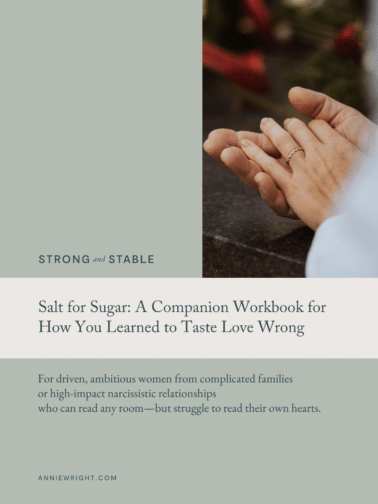Did you know?
- 1 in 5 adults in America will experience a mental illness.
- 1 in 5 children ages 13-18 has or will have a serious mental illness.
- Depression is the leading cause of disability worldwide.
- 42 million American adults have some sort of an anxiety disorder.
- 90% of both adults and teens who die by suicide had an underlying mental illness.*
The bottom line: Mental health struggles are exceedingly common which means that the chance you have someone in your life who struggles with their mental health is high.
And if someone close to you struggles with their mental health – whether it’s episodic or ongoing anxiety, depression, addiction, a mood or personality disorder – you’ve probably often wondered,
“How do I show up for this person?”
Or
“Do I even want to show up for this person?”
Or
“How can I hold boundaries with this person?”
None of these are easy questions and it’s often hard to know what to do or what you’re available for when someone close to you struggles with their mental health.
In today’s post, I dive into this topic and provide a series of prompts and inquiries to help you think through these questions so you can clarify questions you may have if someone close to you struggles with their mental health.
*Statistics provided by The National Alliance on Mental Illness
Some real talk.
When someone close to you struggles with their mental health, it can sometimes feel challenging.
It may also feel easy and seamless sometimes, or you may know nothing different and living with or being close to someone who struggles with their mental health could feel completely normative.
But if you do find it to be challenging – either all the time or some of the time – please remember: you’re allowed to have your feelings.
It doesn’t make you a “bad person” for feeling challenged by the person or their mental health struggles, any more so than it makes the person going through them a “bad person” for having mental health challenges.
You’re allowed to have your experience no matter what it looks like.
This may not be something you’ve heard too often, but it’s more than okay to feel sad, angry, frustrated, tired, hopeless, triggered, or any other feeling you have about being in connection with this person.
I think many of us sometimes should all over ourselves, telling ourselves stories like we should feel one way or the other, we should show up for that person who’s mentally ill even if we don’t want to, we shouldn’t resent or begrudge that person, and so forth.
I don’t think “shoulding” on ourselves is helpful.
When we do that, we’re effectively layering on judgment and shame on top of what already might be tough and painful feeling states, adding even more challenge to our emotional experience that otherwise doesn’t have to be there.
So remember: there is no should about how you might feel or choose to show up when someone close to you struggles with their mental health.
What's Running Your Life?
The invisible patterns you can’t outwork…
Your LinkedIn profile tells one story. Your 3 AM thoughts tell another. If vacation makes you anxious, if praise feels hollow, if you’re planning your next move before finishing the current one—you’re not alone. And you’re *not* broken.
This quiz reveals the invisible patterns from childhood that keep you running. Why enough is never enough. Why success doesn’t equal satisfaction. Why rest feels like risk.
Five minutes to understand what’s really underneath that exhausting, constant drive.
You get to have your experience no matter what this looks like.
Next, remember, you have to consider your own individual context when someone close to you struggles with their mental health.
You have to consider the context.
How we show up for a loved one struggling with their mental health can be very context dependent.
For instance, if it’s your child versus your brother-in-law, or if it’s a parent you don’t care to be close to versus your wife that you adore, a distant acquaintance versus a member of the team you manage at work, the level of investment, care, and availability you have to support this person will vary.
How you can show up for this person will also depend on how their mental health struggles manifest and what your personal capacities are, what resources are at your disposal, what level of personal work you have done to understand, recognize, and assert your own boundaries, how advanced the person’s mental health struggles are, how much space you have left to give them is, etc. etc..
The bottom line: there is no one-size-fits-all model.
There’s no rule here about how and if to show up for a person who struggles with their mental health.
Thinking about this or about how you have or have not shown up for them in the past, you may feel a sense of guilt or even compulsion, wanting to show up with them but just not being able to do so, or feeling like you “should” support them because of some internalized, pressured belief(s) you hold.
At the end of the day, there is no right or wrong way to respond when a person close to you struggles with their mental health.
You’re not supposed to fix them (indeed, you cannot “fix” them!).
What you can do is figure out how you need and want to show up for someone close to you by reflecting on the context of the relationship, on your own personal boundaries, how you need/want to take care of yourself, and action steps that feel reasonable and realistic to you.
To that end, I want to provide some inquiries for you to help answer and address these questions.
Inquiries to consider.
Open a Google doc or crack open your hard-copy notebook and write down your answers to the following:
- What is your level of responsibility to this person (are you a parent/legal guardian? A sibling, manager, or more distant connection?)
- What’s your level of investment in this relationship? In other words, do you care about this relationship and want to invest in it? Or is it a relationship you would be happy to see fade from your life?
- What is the story you tell yourself about how you think you “have to” show up for this person?
- Where did you learn this story?
- Is this – the story you tell yourself – empirically true?
- Answer honestly, what feels good for you in terms of showing up for this person?
- What would feel hard for you?
- In what ways is this person asking/insisting (either implicitly or explicitly) that you show up for them?
- In what ways do you struggle to show up for this person?
- Is it an option for you NOT to show up for this person in this way and instead utilize different resources/options to get them support?
- Who are the other people/resources that can support you? Who is your support team?
- What resistance comes up for you (if any) when you think about changing the way you show up?
- Do you struggle with setting boundaries in any other areas of your life? Does it feel hard to think about setting boundaries with this person?
- If you could hold better boundaries with this person, what would they look like?
- What’s the cost if you keep showing up for this person and keep feeling drained?
- What do you stand to gain if you can change how you show up with this person?
- What are one or two immediate action steps you want to take now that you’ve clarified more about what you are and are not available for?
If, after completing these inquiries you realize you do want to show up for this person but are struggling to imagine concrete steps you could take to do so that might be appropriate and effective, consider the following:
Educate yourself.
If you know what the person close to you is struggling with, consider educating yourself on their diagnosis/issues. Often when we learn more about the symptoms, side effects, and needs those who struggle with particular mental health challenges face, it can be helpful in terms of helping us understand what they might need, that their reactions to us may not be in their control, and education generally helps us feel more in control when we can sometimes feel out of control.
Practice empathy, lots and lots of empathy.
You may not have experienced what the person close to you is going through, but still you can attempt to understand the experience by recalling times you have struggled, by reading or listening to stories of others who deal with what the person close to you deals with, etc.. You can also ask them to share more of their experience with you, tell them you want to understand better.
Ask them what they would like from you.
Sometimes, with the best of intentions, we project our experience onto others and imagine they would like us to respond in a certain way because that’s how we would like to be responded to. But that may not be the case. If you’re wondering how to show up for the person close to you, ask them. You may be surprised at their answers. Of course, check in with yourself to see if you can meet their requests. But if you can, try those out.
Cultivate supports and remember your boundaries.
At the end of the day, when someone close to us is struggling with their mental health we are challenged to practice self-care and to recognize and assert our boundaries in myriad ways. Even as you support this person, don’t forget to pay attention to yourself. Give yourself what you need and want to make showing up for this person sustainable and reasonable for you. You absolutely do get to practice self-care. And you get to hold boundaries when someone close to you struggles with their mental health.
Also, you might want to consider reading this prior blogs of mine:
- 101 Self-Care Suggestions When It All Feels Like Too Much
- How boundaries impact every area of your life and what to do if yours need work
- Yes, sweetheart, you do get to grieve this…
Moving forward.
I hope you found this post helpful and perhaps even a bit validating.
Now I would love to hear from you in the comments below:
Does someone close to you struggle with their mental health? What lessons have you learned about how and if to show up for this person? What has been a support to you as you have either showed up for them or stepped back?
Leave a message in the comments below so our community of blog readers can benefit from your wisdom.
Here’s to healing relational trauma and creating thriving lives on solid foundations.
Warmly,
Annie





